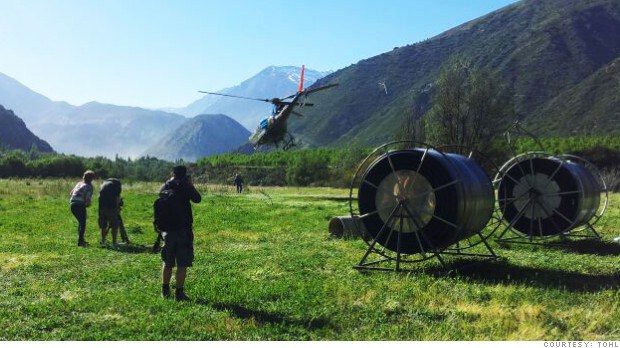
Alumnus Benjamin Cohen made his first appearance in CEEatGT news several years ago for his accomplishments as a student in structual engineering.
Since then his interests in civil and environmental engineering have led to Kickstarter, Echoing Green, and more recently, the tech section of CNN Money/Fortune.
The College of Engineering's inaugural "Georgia Tech Engineers" magazine also features Cohen and fellow Georgia Tech alumni's journey to making global clean water a reality:
A global vision for clean water
TOHL Inc. was designed to address a specific problem: how to transport water when disasters leave an area’s infrastructure unusable. But three years later, it’s grown into a global company that aims to make clean water accessible to everyone.
The idea behind TOHL, which stands for Tubing Operations for Human Logistics, was conceived by Apoorv Sinha in 2010 when he was a chemical and biomolecular engineering (ChBE) student at Georgia Tech. When earthquakes ravaged both Haiti and Chile just weeks apart, Sinha heard media reports of aid pouring in but getting stuck in ports due to destroyed supply chains. Thousands of bottles of water couldn’t be delivered to the people who needed them most because roads were impassable. Bothered by the situation, Sinha met with his adviser, ChBE Professor Matthew Realff, to discuss how to overcome the challenges of distribution in a devastated area.
The solution that came to Sinha involved coil tubing he had seen used in oil fields when he worked in Kuwait.
“In the oil field you have point A and point B and you can't build pillars or structures to support the tubing,” explains Sinha. “It has to be one piece that is that long. In disaster relief we saw the same parallel. We saw point A and point B—a place which has the materials you want and a place that needs them, and there's nothing in between to connect them because the roads are gone or the bridges are broken, or whatever other reason. We saw that parallel and thought if coil tubing can do this under high temperature, high pressure conditions in the oil field, it should be able to do the same in logistical bottlenecks as well.”
Realff suggested recruiting a civil engineering student to help develop the idea, so Sinha called on former calculus classmate and friend Ben Cohen. Together they developed a method to quickly install a pipeline of flexible tubing using a helicopter.
With an idea in place they recruited ChBE student Melissa McCoy, who had the experience needed to help develop a business plan. She in turn helped recruit Travis Horley, a public policy and international affairs major who had worked in South America and who suggested applying for funding through Startup Chile. It was sound advice, and late in 2011, Startup Chile awarded the group $40,000 in funding to get their concept off the ground.
With financing secured, TOHL went to Chile in March 2012, filed a patent, incorporated the company, and prepared to test its technology.
“What we actually filed a patent for,” explains Cohen, who is now TOHL’s president and CEO, “is the process of installing pipeline via helicopter in long segments via the methodology we use, which is a large spool attached to a cargo hook on a helicopter with one homogeneous piece of tubing rolled on the spool. The helicopter flies with the spool suspended from the hook and deploys the tubing as it flies along virtually any terrain, other than power lines.”
You can read the full story on College of Engineering's website, or check out CNN/Fortune's coverage here.
